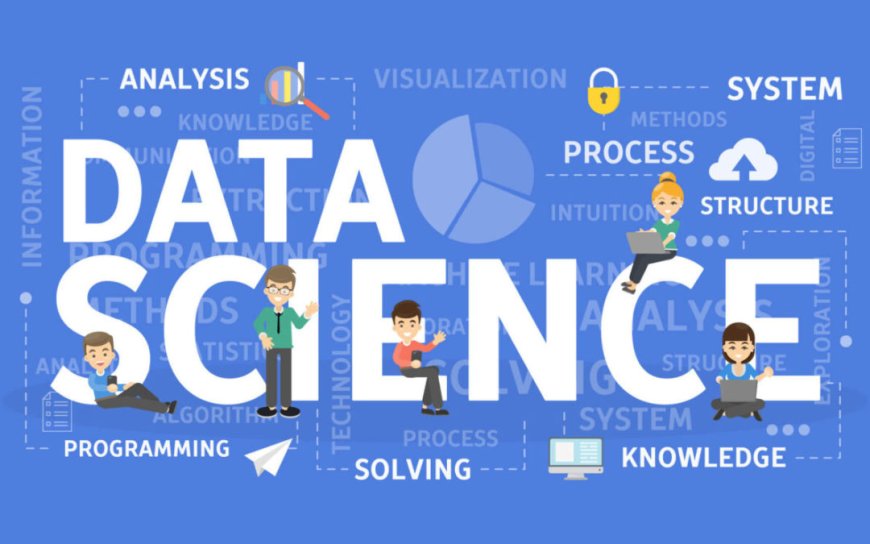Data Science Course

Data science is a "concept to unify statistics, data analysis, informatics, and their related methods" in order to "understand and analyse actual phenomena" with data. It uses techniques and theories drawn from many fields within the context of mathematics, statistics, computer science, information science, and domain knowledge.
A data scientist is the professional who creates programming code and combines it with statistical knowledge to create insights from data.
Data science is a multidisciplinary field that involves using a combination of statistical and computational methods to extract insights and knowledge from data. It combines elements of statistics, computer science, and domain-specific knowledge to analyze complex data sets and make data-driven decisions.
Data science involves a range of tasks, including data collection, data preprocessing and cleaning, data analysis and modeling, and data visualization. It also often involves the use of machine learning and artificial intelligence techniques to build predictive models and automate decision-making processes.
Data scientists work in a wide range of industries, including healthcare, finance, retail, and technology, and they use their skills to solve a variety of problems, such as identifying patterns in customer behavior, predicting disease outbreaks, or detecting fraud.
-
Educational qualifications: A bachelor's degree in a relevant field, such as computer science, statistics, mathematics, engineering, or physics, is usually required. Some advanced courses may require a master's degree or higher.
-
Programming knowledge: Strong programming skills are essential for data science, particularly in languages such as Python, R, or SQL. It is essential to have a good understanding of data structures, algorithms, and object-oriented programming.
-
Statistics and mathematics: A solid understanding of statistics and mathematics is critical to analyze data and build predictive models. Courses in calculus, linear algebra, and probability theory are typically required.
-
Domain knowledge: In addition to technical skills, domain knowledge is also essential. For example, if you are working in healthcare, you should have a good understanding of medical terminology and concepts.
-
Other skills: Communication skills, critical thinking, and problem-solving skills are also necessary for a successful career in data science.
-
Master of Science (MSc) in Data Science by Indian Institute of Technology (IIT), Delhi: This is a 2-year full-time program that covers topics such as machine learning, data mining, and statistical modeling. The program includes coursework, projects, and a research thesis.
-
Advanced Program in Data Sciences (APDS) by Indian Institute of Technology (IIT), Madras: This is a 6-month online program that covers topics such as machine learning, data mining, and big data. The program includes online classes, hands-on projects, and industry mentorship.
-
Post Graduate Diploma in Data Science (PGDDS) by IIIT Bangalore: This is a 1-year full-time program that covers topics such as machine learning, data mining, and big data. The program includes coursework, projects, and industry internships.
-
Post Graduate Program in Data Science (PGPDS) by Praxis Business School: This is a 10-month full-time program that covers topics such as data analytics, machine learning, and big data. The program also includes a capstone project and industry interactions.
-
Post Graduate Program in Data Science and Engineering (PGP-DSE) by Great Learning: This is a 5-month online program that covers topics such as machine learning, deep learning, and natural language processing. The program includes hands-on projects, case studies, and mentorship.
-
Executive Post Graduate Diploma in Data Science (EPGDDS) by International School of Engineering (INSOFE): This is a 1-year part-time program that covers topics such as data mining, statistical modeling, and machine learning. The program includes online and offline classes, industry projects, and mentoring.
Data science requires a diverse set of skills and knowledge across several areas, including computer science, mathematics, statistics, and domain-specific expertise. Here are some of the key requirements for data science:
-
Machine Learning: Machine learning is a key area of data science that involves building predictive models using algorithms and statistical models. You should have knowledge of machine learning techniques, such as supervised and unsupervised learning, and their applications.
-
Domain-specific expertise: In addition to technical skills, domain-specific knowledge is also critical in data science. You should have a good understanding of the industry or field you are working in and the relevant concepts and terminology.
-
Communication Skills: Effective communication is essential in data science. You need to be able to present your findings and insights clearly and effectively to non-technical stakeholders.
-
Data Management: Data management is a critical requirement for data science. You need to know how to collect, clean, store, and organize data to ensure its accuracy and reliability.
-
Programming: Data scientists must have strong programming skills in languages such as Python, R, SQL, or Java. It is also essential to have knowledge of programming concepts such as data structures, algorithms, and object-oriented programming.
-
Statistics and Mathematics: Data science involves using statistical and mathematical methods to analyze data and build predictive models. You should have a solid understanding of probability theory, linear algebra, calculus, and other mathematical concepts.
-
Data Visualization: Data visualization is an essential part of data science. You should know how to create clear and effective visual representations of data to communicate insights and findings.
Work of a data scientist:
-
Data Collection and Preprocessing: Data scientists collect and preprocess data from various sources, such as databases, APIs, or external datasets. They clean, transform, and organize the data to make it suitable for analysis.
-
Exploratory Data Analysis (EDA): Data scientists perform EDA to identify patterns, trends, and outliers in the data. They use statistical methods and visualization techniques to understand the data and uncover insights.
-
Data Modeling and Machine Learning: Data scientists build predictive models using statistical and machine learning techniques to make predictions and forecasts. They use algorithms such as linear regression, decision trees, and neural networks to build models that can detect patterns and make predictions.
-
Data Visualization: Data scientists create visualizations to communicate insights and findings to non-technical stakeholders. They use tools like Tableau, Power BI, or matplotlib to create visual representations of data.
-
Communication and Collaboration: Data scientists work closely with stakeholders from different departments to understand their needs and provide data-driven insights. They need to communicate their findings effectively to non-technical audiences and collaborate with other team members to deliver results.
-
Model Evaluation and Improvement: Data scientists evaluate the performance of their models and refine them to improve their accuracy and reliability. They use techniques such as cross-validation, hyperparameter tuning, and model selection to improve their models' performance.
-
Keeping up-to-date with the latest trends and technologies in data science: Data science is a rapidly evolving field, and data scientists need to stay up-to-date with the latest trends, tools, and technologies to stay competitive and continue delivering value to their organizations.
These are some of the tasks and responsibilities of a data scientist. However, the specific duties can vary depending on the organization, industry, and project requirements.
-
Predictive Analytics: Data science can be used to build predictive models that forecast future trends, patterns, and events. For example, predictive analytics can help businesses forecast demand for their products or services, or help healthcare providers predict disease outbreaks.
-
Fraud Detection: Data science can be used to detect fraudulent activities, such as credit card fraud or insurance fraud, by analyzing patterns and anomalies in transactional data.
-
Recommendation Systems: Data science can be used to build recommendation systems that suggest products or services to users based on their past behavior or preferences. For example, recommendation systems are commonly used in e-commerce and online streaming platforms.
-
Natural Language Processing (NLP): NLP is a branch of data science that focuses on the interaction between computers and human language. NLP can be used to build chatbots, sentiment analysis tools, or language translation tools.
-
Image and Video Recognition: Data science can be used to develop computer vision systems that can recognize images and videos. This technology is used in various applications, such as self-driving cars, security systems, or medical imaging.
-
Personalization: Data science can be used to personalize user experiences by analyzing user behavior and preferences. For example, personalized marketing campaigns can be developed by analyzing user behavior and demographic data.
-
Process Optimization: Data science can be used to optimize business processes by analyzing operational data and identifying areas for improvement. This can help organizations reduce costs, increase efficiency, and improve customer satisfaction.
Career after data science course:
Data science offers a wide range of opportunities in various industries and sectors. Here are some of the potential career paths and opportunities in data science:
-
Data Analyst: Data analysts are responsible for collecting, cleaning, and analyzing data to help organizations make data-driven decisions. They typically use tools like Excel, SQL, and Python.
-
Data Scientist: Data scientists build predictive models using statistical and machine learning techniques to make predictions and forecasts. They use algorithms such as linear regression, decision trees, and neural networks to build models that can detect patterns and make predictions.
-
Machine Learning Engineer: Machine learning engineers build and deploy machine learning models that power products and services. They typically work on a variety of tasks, such as data cleaning, model training, and deployment.
-
Business Analyst: Business analysts use data to help organizations improve their operations, identify new opportunities, and optimize their strategies. They typically work on a variety of tasks, such as data mining, statistical analysis, and reporting.
-
Big Data Engineer: Big data engineers are responsible for designing and maintaining the infrastructure required to process and store large volumes of data. They typically work on tasks such as data ingestion, data storage, and data processing.
-
Data Architect: Data architects design and maintain the overall data architecture for an organization. They work on tasks such as data modeling, database design, and data integration.
-
Data Visualization Expert: Data visualization experts create visualizations to communicate insights and findings to non-technical stakeholders. They use tools like Tableau, Power BI, or matplotlib to create visual representations of data.
Data scientists are responsible for breaking down big data into usable information and creating software and algorithms that help companies and organizations determine optimal operations.
What's Your Reaction?
























































